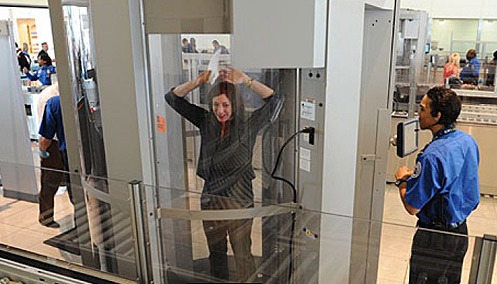Rt Hon Philip Hammond MP
Secretary of State for Transport
Department of Transport
Great Minster House
76 Marsham Street
London SW1P 4DR
09 June 2010
Dear Mr. Hammond,
OPEN LETTER: Full body scanning at Heathrow and Manchester airports
The IHRC is writing to express its deep concern over the use of body scanners at UK airports. On 1st February 2010, the then British government introduced body scanners at Heathrow and Manchester airports. The body scanners produce detailed images of a person as if they were unclothed on a computer screen.
The IHRC objects to the use of body scanners for the following reasons:
– The use of the body scanners violates Article 8 of the European Convention on Human Rights- everyone has the right to respect for his private life. Numerous commentators have described the procedure as an electronic strip search. During the scan, images with intricate details of naked bodies, including the outlines of women’s breasts and the genitalia of both genders, will be seen on a monitor by another person who could be male or female, sitting in a different room. German Security advisor Hans-Detlef Dau, a representative for a company that sells the scanners, admits that the machines “show intimate piercings, catheters and the form of breasts and penises”. The IHRC believes that the right to privacy includes the right to decide who views your body, whether in person or via images. The fact that the screener is unable to identify the passenger does not change the fact that he or she is viewing a near naked image of the passenger. By forcing the passenger to go through the body scanner he/she is being stripped of his / her privacy; his/her right to decide who takes and views images of him/her.
– The fact that this procedure is unnecessary makes the breach of privacy more unacceptable. It is unnecessary for the following reasons:
- A pat down search will be just as effective in finding explosives strapped to the body of any would be bomber (both America and Canada allow a pat down search as an alternative to the body scanner);
- It is entirely implausible to believe that airport security officials will subject every passenger to screening, considering the tremendous cost (around £100,000 for each scanner) and time involved. Consequently, scanning is likely to be conducted on a selective process which unfortunately, due to the climate of Islamophobia we live in, will mean the profiling of Muslim passengers. Profiling itself is very problematic as it is unlikely to catch or deter potential terrorists, who will adopt a different appearance and dress in order to escape profiling. All the 9-11 hijackers, the 7-7 bombers and Umar Farouk Abdulmutallab did not wear beards or Islamic dress when they carried out their missions. Consequently, all would have probably escaped any form of religious profiling at airports had it been carried out;
- The body scanners will not be able to identify most types of explosives. Conservative MP, Ben Wallace, who used to work for QinetiQ, a scanning technology firm, warned that full-body scanners can be unreliable in detecting “low-density” materials like plastics, chemicals, and liquids, which is what Abdulmutallab had stuffed in his underwear;
- Most countries do not use scanners. This means that there are large numbers of passengers who are entering the UK who could pose a threat to the UK. Yet we are being scanned as we leave the UK. There is no security benefit to the UK as a terrorist may still attack the UK by boarding a plane in a country where security scanners are not used.
– Due to the explicit nature of the pictures that the body scanners create, the IHRC believes that the government will be breaching section 1 of the Protection of Children Act 1978, namely the prohibition against the taking of indecent images of children.
– The IHRC is also concerned by the government’s statement that:
“The machines used have no capability to save, store or print the images viewed by the screener”
There have been independent reports that the body scanner machines do in fact have the capability to save, store or print images.
http://edition.cnn.com/2010/TRAVEL/01/11/body.scanners/
During this year’s election campaign both the Conservative party and the Liberal Democrats discussed the issue of civil liberties. They correctly identified the massive encroachments in civil liberties under the previous government over the last decade and discussed how they would restore the freedoms Britain has always held sacred.
The document, “The Coalition: Our Programme for Government” states that the new government “will be strong in defence of freedom… restore the rights of individuals in the face of encroaching state power, in keeping with Britain’s tradition of freedom and fairness… implement a full programme of measures to reverse the substantial erosion of civil liberties and roll back state intrusion… [and] introduce safeguards against the misuse of anti-terrorism legislation.”
These are commendable principles and it is pleasing to know that the new government is serious about civil liberties. If the Coalition government wants to govern by these principles it must abandon the previous government’s policy of destroying individual civil liberties and restore the rights of people to them.
In light of the government’s support for civil liberties, the IHRC urges the government to stop the use of body scanners at airports. It was a hasty knee-jerk reaction by the previous government to a single event, a reaction that does not effectively tackle the issue of international aviation security and erodes our civil liberties.
Yours sincerely,
Massoud Shadjareh




